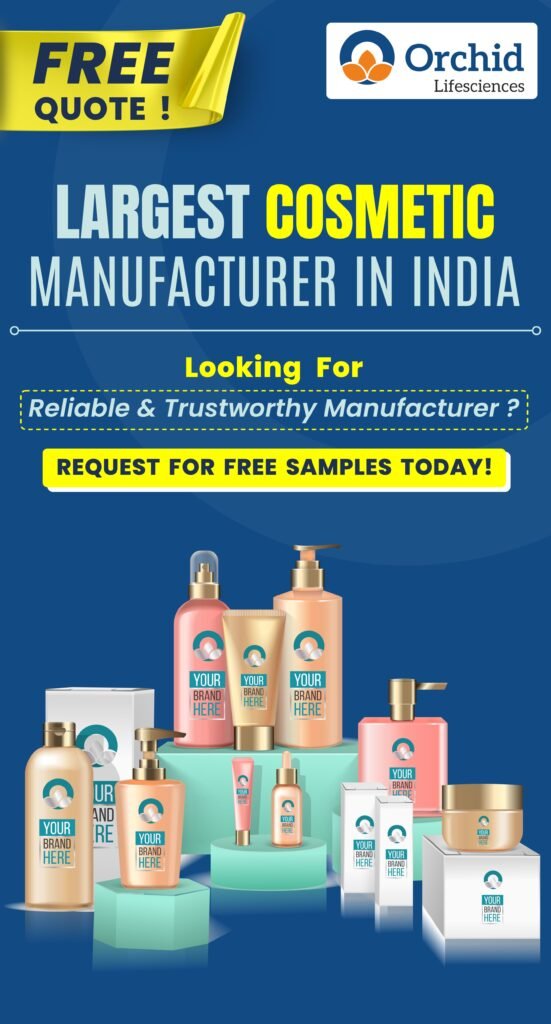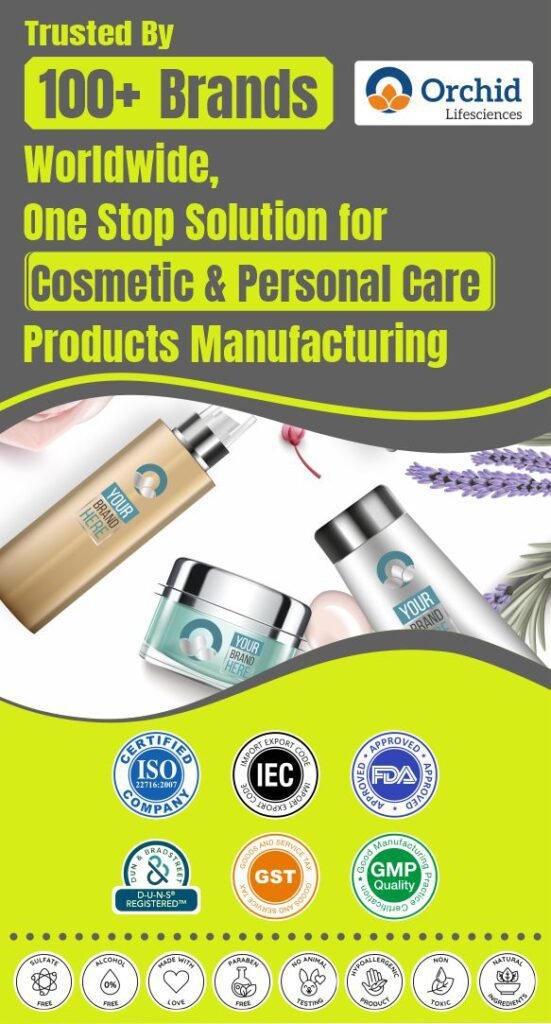Gujarat has become a hub for Ayurvedic toothpaste manufacturing, with a particular emphasis on Neem toothpaste production due to the herb’s potent antibacterial and anti-inflammatory properties. As a leading Neem toothpaste manufacturer in Gujarat, many companies specialize in creating natural, effective and high quality oral care products that leverage traditional Ayurvedic principles.
These manufacturers offer private label services, enabling brands to customize their Neem toothpaste formulations to align with unique market demands. Known for producing trusted and effective products, Gujarat’s Neem toothpaste manufacturers deliver a powerful combination of Neem’s natural benefits with advanced manufacturing practices, making Ayurvedic oral care accessible to a global audience seeking healthier, chemical-free alternatives.
Key Neem Toothpaste Manufacturer in Gujarat
Neem toothpaste has gained popularity in India and around the world due to its natural properties and effectiveness in oral hygiene. In Gujarat, several key manufacturers contribute to this market with a range of neem-based toothpaste. Let’s take a closer look at some of the prominent companies that produce neem toothpaste in the region:
1. Orchid Lifesciences
Orchid Lifesciences is a noteworthy manufacturer in Gujarat, focusing on Ayurvedic and herbal products, including neem toothpaste. Known for using natural ingredients, the company capitalizes on Neem’s antibacterial and antifungal properties, appealing to consumers who prioritize natural oral care. Orchid Lifesciences often emphasizes the traditional health benefits of neem, which is a popular ingredient in Ayurveda for maintaining oral health. The brand seeks to combine modern science with Ayurvedic principles, targeting a market segment that values organic and sustainable products.
For the past multiple years, Orchid Lifesciences has been leading the third party manufacturing industry because of its dedicated team which works hard for better product quality & effectiveness. Not only this Orchid Lifesciences also leads to having one of the best manufacturing units in the nation which can cater to various batch sizes, ranging from 25 kgs to 2000 kgs per batch. Orchid Lifesciences is capable of filling 25 to 55 Lakh tubes per month, 5 to 15 Lakh bottles per month, and 5 to 12 Lakh jars per month. Due to excessive demand, Orchid Lifesciences also introduced new pouch packaging machines with a filling capacity of 55 Lakh pouches per month.
Address:
Plot No. 68-72, Tribhuvan Industrial Estate, Road No.11, Nr. Kathwada GIDC, Kathwada, Ahmedabad, Gujarat-382430
Contact:
+91-8980815444
+91-9898026828
+91-9922840985
Email – marketing@orchidlifesciences.com
Website:
https://orchidlifesciences.com/
2. Colgate Palmolive
Colgate-Palmolive, a globally recognized leader in oral care, has also ventured into the neem toothpaste segment. The brand launched variants like “Colgate Vedshakti” to cater to the Indian consumer’s demand for natural products. Colgate’s neem toothpaste is produced with Ayurvedic ingredients like neem, clove, amla, and tulsi, aiming to provide a holistic approach to oral hygiene. Colgate’s strong brand image and widespread distribution network have helped it capture a large share of the Indian market. The company’s strategy of incorporating traditional Indian ingredients like neem, combined with its reputation for effective, quality products, has allowed it to penetrate both urban and rural areas in Gujarat.
3. Dabur
Dabur is one of India’s largest and most respected Ayurvedic and natural health product companies. Known for its expertise in Ayurveda, Dabur offers “Dabur Red Neem” toothpaste as part of its herbal oral care line. This toothpaste combines neem with other Ayurvedic ingredients to create a product designed to prevent cavities, plaque buildup, and gum diseases. Dabur’s focus on natural and herbal health solutions has made it a trusted name, especially among consumers who prefer Ayurvedic remedies. In Gujarat, Dabur has a robust supply chain and a loyal customer base, thanks to its longstanding reputation and commitment to quality.
4. Patanjali
Founded by Baba Ramdev, Patanjali Ayurved has revolutionized the Indian FMCG sector, particularly in the natural and Ayurvedic product categories. Patanjali offers neem toothpaste as part of its dental care line, combining neem’s benefits with other herbs to create an effective oral care product. Known for its affordable pricing and wide accessibility, Patanjali’s neem toothpaste appeals to a broad demographic, from rural households to urban consumers looking for cost-effective and natural oral care solutions. Patanjali’s rapid growth and extensive distribution networks across India, including in Gujarat, have made it a formidable competitor in the neem toothpaste market.
5. Vicco Laboratories
Vicco is another major player in the herbal and Ayurvedic product sector, particularly well-known for its Vicco Vajradanti line, which includes a neem-based variant. The brand has a strong following due to its commitment to Ayurvedic ingredients and its focus on tooth and gum health. Vicco’s neem toothpaste is particularly targeted at consumers looking for effective traditional remedies for oral care. Unlike some of its competitors, Vicco has built its brand exclusively around Ayurvedic products, which helps attract consumers specifically seeking herbal options.
Neem and Its Benefits in Oral Care
- Neem, an evergreen tree native to India, has been celebrated for centuries for its medicinal properties. In oral care, neem’s antibacterial, antifungal, and anti-inflammatory qualities make it a potent ingredient for maintaining dental health. Extracts from neem leaves, twigs, and bark are packed with bioactive compounds that not only protect against infections but also improve gum health, prevent cavities, and maintain fresh breath.
- The antibacterial properties of neem are especially valuable for controlling the growth of bacteria in the mouth, particularly Streptococcus mutans, a primary cause of dental plaque and cavities. The compounds in neem work by inhibiting the bacterial growth that contributes to plaque formation, tooth decay, and bad breath. This natural defence mechanism helps reduce the risk of gum disease (gingivitis) and can even reverse early signs of inflammation in the gums due to its anti-inflammatory effects.
- In terms of oral hygiene products, neem toothpaste offers notable benefits. Neem’s antifungal properties protect against fungal infections that can sometimes develop in the mouth, such as thrush. These antifungal benefits, combined with its antibacterial effects, make neem toothpaste effective for those prone to gum infections or bad breath. By regularly using neem toothpaste, users can experience fresher breath due to its ability to neutralize odour-causing bacteria, while the anti-inflammatory properties of neem help soothe irritated gums and reduce bleeding. Additionally, the antioxidant compounds in neem contribute to overall oral health by protecting the gums and teeth from oxidative stress and damage.
- When comparing neem toothpaste to conventional toothpaste, several distinctions emerge. Conventional toothpaste often relies on synthetic ingredients, such as fluoride, triclosan and artificial flavours, to fight cavities, freshen breath, and provide a satisfying flavour. While fluoride has benefits for enamel strengthening and cavity prevention, some individuals prefer natural alternatives due to concerns about potential side effects or allergies. Neem toothpaste, on the other hand, offers a plant-based solution that is free from many synthetic chemicals and additives. This makes it appealing to those who want a holistic approach to oral care.
- In summary, neem’s therapeutic qualities make it a powerful alternative to conventional oral hygiene products, offering a natural means to prevent cavities, soothe gums, and maintain a fresh and healthy mouth. For individuals seeking a more natural, effective approach to oral care, neem toothpaste presents a compelling choice, harnessing centuries-old wisdom with proven scientific benefits.
Gujarat as a Hub for Neem-Based Product Manufacturing
- Gujarat has emerged as a significant centre for neem-based product manufacturing in India, combining a strong industrial base, rich natural resources, and an evolving infrastructure for herbal product innovation. As the global demand for sustainable and plant-based products grows, Gujarat is uniquely positioned to lead in neem-based manufacturing, with its strategic advantages making it a focal point for businesses specializing in natural and organic goods.
- As one of India’s most industrialized states, Gujarat plays a key role in the country’s manufacturing sector. The state boasts a proactive business environment, efficient regulatory frameworks, and supportive government policies that attract both domestic and foreign investments. Cities like Ahmedabad, Vadodara, and Surat are hubs of manufacturing excellence, equipped with modern facilities and a robust transportation network. Additionally, Gujarat’s strategic location on India’s west coast, with major ports like Kandla and Mundra, provides convenient access to global markets, enabling neem-based product manufacturers to efficiently export goods worldwide. The state’s business-friendly climate, along with government incentives for industries focusing on natural products, creates ideal conditions for the expansion of neem-based manufacturing.
- Gujarat’s natural environment further supports its role in neem production, as the region has an abundant supply of neem trees (Azadirachta indica). The neem tree, native to India and highly valued for its medicinal and agricultural benefits, thrives in Gujarat’s climate. This local availability of neem minimizes transportation costs for raw materials, making production more sustainable and economically efficient. The state’s access to high-quality neem, combined with other native herbal ingredients, enables manufacturers to source key components locally. By relying on indigenous resources, manufacturers reduce costs and enhance their products’ appeal to environmentally conscious consumers.
- Another strength of Gujarat’s neem-based manufacturing sector lies in its skilled labour pool and advanced facilities. The state has a tradition of expertise in herbal processing, as well as a workforce that combines knowledge of traditional practices with modern technical skills. This blend of traditional herbal knowledge and contemporary production practices supports innovation and quality in neem-based products. Many manufacturing facilities in Gujarat are equipped with advanced technologies for extraction, distillation, and packaging, ensuring that neem-based products meet international standards for efficacy, purity, and safety. Additionally, the presence of research and development (R&D) centres in Gujarat allows for continuous innovation in neem-based product formulations, helping manufacturers to develop products with enhanced benefits for health, agriculture, and personal care.
- Moreover, the Gujarat government’s emphasis on organic and natural products has driven the development of specialized facilities tailored to the herbal industry. These facilities often include dedicated equipment for large-scale neem processing, quality control labs, and the ability to obtain certifications that meet both domestic and international regulatory requirements. By providing access to such infrastructure, Gujarat enables local manufacturers to compete with international players, capitalizing on the increasing global interest in eco-friendly and plant-based products.
- In conclusion, Gujarat’s role as a hub for neem-based product manufacturing is supported by its industrial strengths, abundant resources, skilled workforce, and government backing. The state’s strategic position in India’s manufacturing sector, along with its emphasis on innovation and quality, makes it an ideal location for the production of neem-based products. As global awareness and demand for sustainable products continue to grow, Gujarat is well-poised to remain a leader in neem-based manufacturing, contributing to India’s role in the international herbal products market…
Importance of Certifications for Herbal and Ayurvedic Products
Consumer Trust and Confidence
Certifications give consumers assurance that the products they use are safe and meet regulatory standards. For herbal products like neem toothpaste, which are expected to be free from harmful chemicals, certifications play a vital role in establishing credibility and trust.
1. Compliance with Regulatory Standards
The herbal and Ayurvedic industry is governed by regulations that mandate product quality and safety. Certifications indicate compliance with these regulations, helping companies avoid legal issues and product recalls that can damage their reputation.
2. Market Access and Export Opportunities
Many markets, both domestic and international, require certifications for herbal products. These certifications allow companies to expand their market reach, both within India and globally, particularly in countries where there is growing demand for natural and Ayurvedic products.
3. Ensuring Authenticity and Consistency
Quality standards ensure that the products contain authentic ingredients in the right proportions, safeguarding consumers from substandard or adulterated products. This is especially important in herbal products where consistency in potency is critical for efficacy.
Common Certifications for Neem Toothpaste Manufacturer in Gujarat
ISO (International Organization for Standardization)
ISO certifications, especially ISO 9001 (Quality Management Systems), ensure that companies adhere to international quality standards in production and management. This certification is widely respected and indicates a commitment to quality and continuous improvement.
1. AYUSH Certification
In India, the Ministry of AYUSH (Ayurveda, Yoga & Naturopathy, Unani, Siddha, and Homeopathy) certifies Ayurvedic and herbal products. AYUSH certification is essential for neem toothpaste manufacturers as it guarantees compliance with traditional Ayurvedic practices and modern quality requirements.
2. GMP (Good Manufacturing Practices)
GMP certification ensures that products are consistently produced and controlled according to quality standards. It covers all aspects of production, from raw material sourcing to manufacturing processes, packaging, and distribution, ensuring product safety and consistency.
3. FSSAI (Food Safety and Standards Authority of India)
Although primarily for food, FSSAI certification is also relevant for certain oral care products. It ensures that neem toothpaste is free from harmful additives and contaminants, reinforcing consumer trust in the product’s safety.
4. Organic Certifications
For companies that use organic neem, certifications from organizations like USDA Organic or India Organic confirm that the raw materials are grown without pesticides and synthetic fertilizers, appealing to consumers who prefer organic products.
Steps Companies Take to Ensure High-Quality, Safe Products
1. Sourcing High-Quality Raw Neem
Quality assurance begins with sourcing. Reputable companies source neem from certified suppliers who adhere to organic or sustainable farming practices. This helps avoid pesticide residues and other contaminants in the final product.
2. Research and Development (R&D)
Leading companies invest in R&D to develop formulations that maximize the benefits of neem and other ingredients. R&D teams conduct studies on neem’s properties and explore combinations with other Ayurvedic ingredients to improve the toothpaste’s effectiveness.
3. Rigorous Testing and Quality Control
Neem toothpaste manufacturers conduct multiple tests, including microbiological, chemical, and stability tests. These tests ensure the product’s safety, potency, and shelf life. Quality control checks occur at each stage, from raw materials to final product, to ensure consistency and adherence to quality standards.
4. Batch-to-Batch Consistency
To maintain uniformity, manufacturers implement batch-to-batch testing to ensure that every batch meets the same high-quality standards. This involves checking the concentration of active ingredients like neem extract and ensuring that other ingredients do not compromise their efficacy.
5. Adherence to GMP Standards in Manufacturing
Good Manufacturing Practices (GMP) help ensure a controlled production environment. Companies implement stringent hygiene protocols, worker training, and monitoring processes to maintain cleanliness and safety during production.
6. Regular Audits and Certification Renewals
Companies undergo regular audits to maintain certifications. These audits, often conducted by third-party organizations, assess the company’s adherence to quality standards and identify areas for improvement. Renewal of certifications also keeps manufacturers up to date with the latest quality standards and industry advancements.
Challenges Faced by Neem Toothpaste Manufacturer in Gujarat
Neem toothpaste manufacturers in Gujarat operate in a promising yet challenging market. Despite the rising popularity of natural and herbal oral care products, these manufacturers face several obstacles that complicate production, sales, and compliance. Below, we explore the primary challenges, including sourcing quality raw neem in large quantities, competing with major FMCG companies, and navigating regulatory and compliance hurdles in both domestic and international markets.
1. Sourcing Quality Raw Neem in Large Quantities
One of the primary challenges for neem toothpaste manufacturers in Gujarat is securing a consistent and high-quality supply of neem. This challenge can be broken down into several factors:
Seasonal Availability and Quality Variability
Neem is primarily harvested seasonally, which means manufacturers may face shortages during off-seasons. Furthermore, the quality of neem can vary based on factors like weather conditions, soil quality, and pest exposure. High-quality neem, which is essential for ensuring the therapeutic properties of the toothpaste, can be difficult to source consistently.
Increased Demand for Neem in Other Sectors
Neem is widely used in multiple industries beyond oral care, including cosmetics, pharmaceuticals, and agriculture. This high demand puts additional pressure on neem suppliers, making it challenging for toothpaste manufacturers to procure enough raw materials.
Cost Implications of Quality Neem
The price of high-quality neem has been on the rise due to demand, and purchasing large quantities at a high cost can be financially burdensome for smaller manufacturers. Balancing the need for premium ingredients with the requirement to maintain competitive pricing is a significant financial strain, especially when competing with larger brands that can negotiate better terms with suppliers.
Sustainability and Ethical Sourcing Concerns
As demand for neem grows, sustainable harvesting practices are necessary to avoid depleting neem resources. Manufacturers increasingly prioritize ethical sourcing, requiring them to vet suppliers carefully to ensure that neem is harvested sustainably. This process is time-consuming and can be costly but is essential for long-term product viability.
2. Competition from Larger FMCG Companies and International Brands
The neem toothpaste segment in Gujarat is highly competitive, with both local brands and major FMCG (Fast-Moving Consumer Goods) players vying for market share. This competition brings several specific challenges:
Market Dominance of Large FMCG Brands
Multinational and Indian FMCG companies like Orchid Lifesciences, Colgate-Palmolive, Dabur, and Patanjali have established a stronghold in the oral care market, often commanding extensive distribution networks, larger advertising budgets, and significant brand loyalty. Smaller manufacturers struggle to compete with these established brands in terms of both visibility and reach.
Pricing and Economies of Scale
Large FMCG companies benefit from economies of scale, allowing them to produce at a lower cost per unit and offer products at competitive prices. Smaller manufacturers may find it difficult to keep their products affordable while maintaining quality, as they lack the purchasing power to negotiate lower costs for raw materials and packaging.
Consumer Perception and Brand Recognition
Consumers often gravitate toward familiar brands, trusting them for quality and effectiveness. Although there is a rising interest in herbal products, many consumers still prefer well-known brands over smaller or newer entrants in the market. Neem toothpaste manufacturers must invest heavily in marketing to build brand recognition, which can be costly and time-consuming.
Innovation and R&D Capabilities
Large FMCG brands have dedicated R&D teams that can continuously innovate and improve products based on consumer preferences and trends. Smaller companies may not have the resources to conduct extensive research, making it challenging to keep up with evolving consumer demands for enhanced product benefits, packaging, or formulation.
3. Regulatory and Compliance Challenges in Domestic and Export Markets
Neem toothpaste manufacturers also face regulatory challenges, which are particularly complex given the nature of herbal products and the diverse markets they aim to enter:
Domestic Compliance and Quality Standards
In India, herbal and Ayurvedic products are regulated by the Ministry of AYUSH and other local bodies. Manufacturers must adhere to stringent guidelines for product formulation, labelling, and quality assurance. Compliance requires thorough documentation, regular audits, and investment in quality control processes, all of which can be resource-intensive.
Export Market Regulations
Exporting neem toothpaste presents additional challenges, as international markets often have specific regulations for herbal products. For example, the U.S., EU, and Gulf countries each have their regulatory requirements. Obtaining certifications like the FDA (for the U.S.), CE (for Europe), or Halal certification (for the Middle East) requires extensive testing, documentation, and expenses, which can be challenging for smaller manufacturers to manage.
Labeling and Marketing Restrictions
Different countries have varying regulations regarding labelling and marketing claims for herbal products. Some regions prohibit health claims without scientific backing, meaning that manufacturers cannot always highlight the full benefits of neem without additional clinical trials. These limitations can hinder the appeal of neem toothpaste in foreign markets and reduce its competitive edge against established products.
Intellectual Property and Brand Protection
In markets where neem toothpaste is a new concept, intellectual property protection is essential to prevent product counterfeiting or imitation. However, obtaining patents or trademarks internationally can be a lengthy and expensive process, placing additional pressure on smaller companies that may not have the resources for legal protection.
Adapting Formulations for Compliance
In certain markets, the permissible limits of specific ingredients, even natural ones, are tightly regulated. Manufacturers may need to adjust their formulations to meet local standards, which can alter the product’s effectiveness or appeal. Reformulation not only incurs additional costs but may also impact the product’s positioning and brand identity.
Future Prospects for Neem Toothpaste Manufacturing in Gujarat
Neem toothpaste has gained immense popularity for its natural antibacterial, antifungal, and anti-inflammatory properties, and Gujarat is well-positioned as a key hub for manufacturing Ayurvedic and herbal products, including neem toothpaste. The prospects for neem toothpaste manufacturing in Gujarat are promising, driven by rising consumer demand, advancements in production technology, and expanding market opportunities both domestically and globally. Here’s a detailed look at the potential for market growth, technological advancements, and new opportunities for both existing and emerging manufacturers.
1. Expected Market Growth and Potential for Gujarat-Based Manufacturers
Growing Consumer Preference for Natural and Ayurvedic Products
Consumer interest in natural and herbal products is rapidly increasing, both in India and globally, as people seek alternatives to chemical-based personal care items. The growing awareness of neem’s health benefits for oral hygiene, including its ability to fight plaque, reduce gum inflammation, and prevent cavities, has created significant demand for neem toothpaste. With Gujarat’s established infrastructure and skilled labour force in the Ayurvedic and herbal sectors, local manufacturers are well-positioned to capitalize on this trend.
Expanding Domestic Market for Herbal Toothpaste
The Indian market for herbal and Ayurvedic oral care products has shown steady growth, driven by the increased health consciousness among consumers. By 2028, India’s herbal toothpaste market is expected to see substantial growth as more people prioritize natural ingredients. For Gujarat-based manufacturers, this growing domestic market presents an opportunity to strengthen their presence and brand identity within India, tapping into both urban and rural consumer bases.
Global Market Expansion for Ayurvedic Products
With rising global demand for Ayurvedic products, neem toothpaste manufacturers in Gujarat have promising export opportunities. The global herbal toothpaste market is expected to grow significantly, with increasing demand from North America, Europe, and Southeast Asia. Countries with a large Indian diaspora, such as the United States, the United Kingdom, and Canada, are particularly receptive to Ayurvedic products, making them ideal export destinations for neem toothpaste.
Government Support and Incentives for Ayurvedic Industries
The Indian government has launched initiatives to support and promote the Ayurvedic and herbal sectors, including tax benefits, subsidies, and export incentives. Gujarat, known for its industrial-friendly policies, can benefit from these government schemes to reduce costs and encourage expansion. This support can help manufacturers invest in infrastructure, improve production processes, and enhance product quality, positioning Gujarat as a leading supplier of neem toothpaste.
2. Advancements in Production Technology and Product Innovation
Improved Extraction and Processing Techniques for Neem
Advances in extraction technology now allow for higher-quality and more concentrated neem extracts, preserving the potency of active compounds such as azadirachtin, which is known for its antibacterial properties. By using more advanced extraction methods, manufacturers can create neem toothpaste formulations that are more effective and consistent in quality.
Incorporation of Other Ayurvedic Ingredients
Many manufacturers are innovating by combining neem with other Ayurvedic ingredients such as clove, tulsi, and mint, which provide additional benefits like freshening breath and reducing oral infections. These combinations appeal to consumers who seek holistic oral care, and Gujarat-based manufacturers are exploring these blends to offer unique, differentiated products.
Environmentally Friendly and Sustainable Packaging
As consumer awareness of environmental issues grows, the demand for sustainable packaging is also increasing. Many neem toothpaste manufacturers are shifting to eco-friendly, biodegradable packaging to appeal to environmentally conscious consumers. Advancements in sustainable packaging technology provide an opportunity for manufacturers to further differentiate their products and enhance their market appeal.
Automation and Streamlined Production Processes
Automation in manufacturing has become more accessible, allowing neem toothpaste manufacturers to increase efficiency, reduce costs, and improve quality consistency. Automated mixing, filling, and packaging systems help streamline the production process, enabling manufacturers to scale production and meet growing demand without compromising quality.
Digital Marketing and E-commerce Growth
With the growth of e-commerce and digital marketing, Gujarat-based neem toothpaste manufacturers can now reach a wider audience, both within India and internationally. Leveraging digital platforms allows companies to educate consumers on the benefits of neem and Ayurveda, while also offering the convenience of online shopping. E-commerce partnerships with platforms like Amazon, Flipkart, and international e-retailers create new channels for expanding sales.
3. Opportunities for New Players and Expansions in Domestic and Export Markets
Rising Demand for Specialty Herbal Toothpaste
There is an emerging consumer trend for speciality toothpaste that targets specific oral health issues, such as sensitivity, whitening, and gum care. New and existing manufacturers can develop neem-based products tailored to these specific needs, positioning themselves as solution-oriented brands in the natural oral care space. Gujarat, with its access to raw materials and Ayurvedic expertise, provides an ideal environment for creating and marketing these niche products.
Increased Interest in Ayurvedic Products Internationally
Ayurveda’s popularity is on the rise globally, creating new opportunities for neem toothpaste exports. Gujarat-based manufacturers can benefit from this trend by focusing on markets where Ayurvedic products are becoming more mainstream. By obtaining internationally recognized certifications, such as FDA approval or organic certifications, companies can further strengthen their reputation and credibility in export markets, paving the way for expansion.
Entry of New Small and Medium Enterprises (SMEs)
The growth of the neem toothpaste market presents an attractive opportunity for new small and medium enterprises (SMEs) in Gujarat. With relatively low barriers to entry and government support, SMEs can start by focusing on local markets and eventually expand as they gain brand recognition. By adopting innovative approaches and emphasizing product quality, these smaller companies can carve out their market segments.
Collaboration with Research Institutions for Product Development
Collaborations between neem toothpaste manufacturers and research institutions can drive innovation, particularly in R&D for new formulations and production techniques. Gujarat, home to several prominent research centres and universities, offers manufacturers the chance to collaborate on studies that explore the benefits of neem and other Ayurvedic ingredients, leading to scientifically-backed products that appeal to discerning consumers.
Potential for Brand Diversification and Product Line Extensions
Established neem toothpaste manufacturers can diversify their product lines by introducing other neem-based oral care products, such as mouthwash, dental powder, and gum treatments. By expanding their offerings, companies can build a comprehensive brand image in the natural oral care space, encouraging consumers to adopt a full regimen of neem-based products for a holistic approach to oral health.
Increasing Awareness through Social Media and Educational Campaigns
Educating consumers on the benefits of neem and Ayurveda is essential for driving demand. Manufacturers can leverage social media platforms to engage with health-conscious consumers, providing educational content on the benefits of neem for oral health. Influencer marketing and partnerships with health experts can also play a key role in spreading awareness and establishing brand credibility.
Conclusion
As one of the leading neem toothpaste manufacturers in India, Orchid Lifesciences and other top toothpaste manufacturing companies in Gujarat deliver exceptional oral care solutions that harness the power of natural ingredients like neem to promote oral health. Neem toothpaste, with its antibacterial and antifungal properties, is a preferred choice for combating tooth decay, supporting gum health, and enhancing holistic oral hygiene.
Leading toothpaste manufacturers like Orchid Lifesciences, located in industrial hubs such as Tribhuvan Industrial Estate and Kathwada GIDC, offer a variety of toothpaste formulations, including gel and herbal options with active ingredients like clove and mint. Known for providing private label and third party toothpaste manufacturing services, these companies meet the demand for high-quality toothpaste at competitive prices, both in India and internationally.
Upholding stringent quality standards and sourcing from trusted suppliers, manufacturers in Ahmedabad, Bodakdev, and Sindhu Bhavan Road are recognized for their ability to cater to the diverse needs of the oral care market. From premium neem active toothpaste to formulations that combat plaque and bacteria, Gujarat’s neem toothpaste manufacturers deliver products that are not only effective but also aligned with Ayurvedic principles, making them a preferred choice for those seeking a natural, holistic oral care solution.






